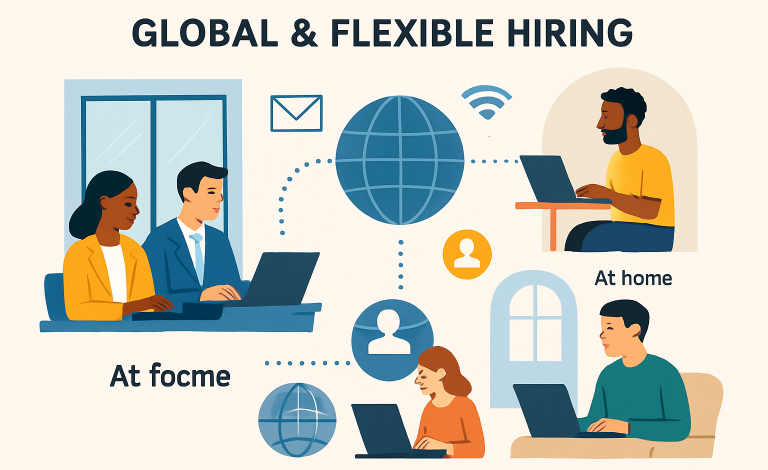How Modern Hiring Practices Are Reshaping Workplaces

Introduction
In today’s dynamic employment landscape, organizations are moving beyond traditional hiring strategies to embrace modern techniques that value competencies, adaptability, and diversity. The integration of new technologies and an emphasis on practical skills are transforming both how companies evaluate candidates and how employees experience the workplace. Applicant tracking tools are instrumental in this evolution, helping businesses streamline and optimize their recruitment processes to attract and retain top talent.
This shift is not only a response to changing market demands but also a proactive strategy for building resilient and innovative organizations. Companies adopting these approaches are better positioned to source talent from a wider range of backgrounds, reduce hiring biases, and foster environments where people from all walks of life can succeed. Through efficient recruitment platforms, businesses can adapt rapidly to industry shifts, creating workplaces that thrive on talent, creativity, and collaboration.
Skills-Based Hiring: Prioritizing Competence Over Credentials
Organizations increasingly turn to skills-based hiring practices, focusing on what candidates can do rather than simply what degrees they hold or the number of years on their résumés. This approach allows companies to identify competent individuals with unconventional backgrounds or self-taught expertise, especially in fast-growing tech and green energy sectors. According to a Forbes article, companies implementing skills-based hiring have access to a deeper talent pool and see greater employee potential for growth and retention.
This practice increases the range of suitable candidates and helps organizations become more diverse and innovative. By removing barriers tied to pedigree, hiring managers encourage talents from various educational, cultural, and professional backgrounds to contribute fresh perspectives to business challenges.
AI Integration in Recruitment: Enhancing Efficiency and Objectivity
The use of artificial intelligence (AI) in recruitment brings remarkable efficiency to the hiring process. AI algorithms can automate repetitive administrative tasks, from screening thousands of applications to scheduling interviews and even conducting initial chat-based screenings. This not only accelerates the recruitment timeline but also introduces data-driven insights that inform decision-making while minimizing the human biases that sometimes undermine equitable hiring.
However, effective AI recruitment systems require careful oversight. As highlighted by a Wall Street Journal investigation, algorithms must be rigorously monitored to avoid encoding or perpetuating biases present in the data they’re trained on. When managed responsibly, AI-powered platforms help organizations make faster, fairer, and more informed hiring decisions, improving outcomes for employers and job seekers.
Remote and Hybrid Work Models: Redefining Workplace Flexibility
Normalizing remote and hybrid work options has fundamentally transformed hiring practices and organizational culture. With geographic limitations now relaxed, companies are discovering talent worldwide and giving employees greater choice in how and where they work. For candidates, this expands employment opportunities; for organizations, it paves the way to building globally diverse teams. Modern applicant tracking tools simplify international recruitment, manage varied onboarding processes, and ensure compliance across different regions.

While remote work increases flexibility and engagement, it also introduces challenges around collaboration, communication, and maintaining a sense of community. Successful companies invest in digital communication platforms, regular virtual check-ins, and well-structured onboarding programs to bridge the distance and keep their teams connected.
Diversity, Equity, and Inclusion: Building Inclusive Work Environments
Employers are now centering diversity, equity, and inclusion (DEI) as core elements of hiring strategies. DEI-focused recruitment involves actively ensuring job postings are accessible and welcoming, using objective evaluation criteria, and training interviewers on recognizing and mitigating biases. These efforts help companies unlock innovation and better represent their diverse customer bases. Harvard Business Review reports that companies with robust DEI policies demonstrate higher employee satisfaction, broader creativity, and stronger financial performance.
Inclusive hiring isn’t just about meeting quotas but fundamentally rethinking how workplace culture and opportunity are distributed, ensuring everyone has the support and resources needed to thrive.
Gamified Assessments: Engaging and Evaluating Candidates Effectively
Gamified assessments offer a new lens for evaluating candidates’ potential by turning traditional testing into interactive, real-world challenges. Companies can observe how candidates approach problem-solving, creativity, and teamwork through simulations, games, and scenario-based tasks. This immersive method gives a clearer picture of how candidates will perform in the role, creating a fairer and more engaging experience for applicants, while reducing the potential for resume exaggeration or biased judgment.
Modern hiring practices are ushering in a future where talent is evaluated holistically, inclusivity is foundational, and workplace success is measured by collaboration and innovation. By integrating the latest technology, prioritizing skills over credentials, and focusing on building a diverse, adaptable workforce, organizations are setting the stage for lasting business success in the new world of work.




